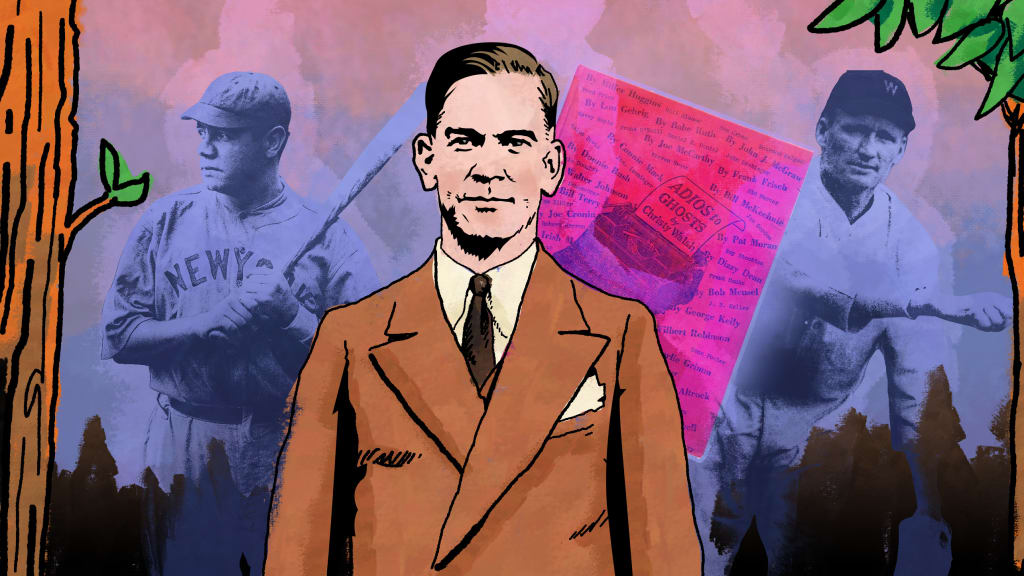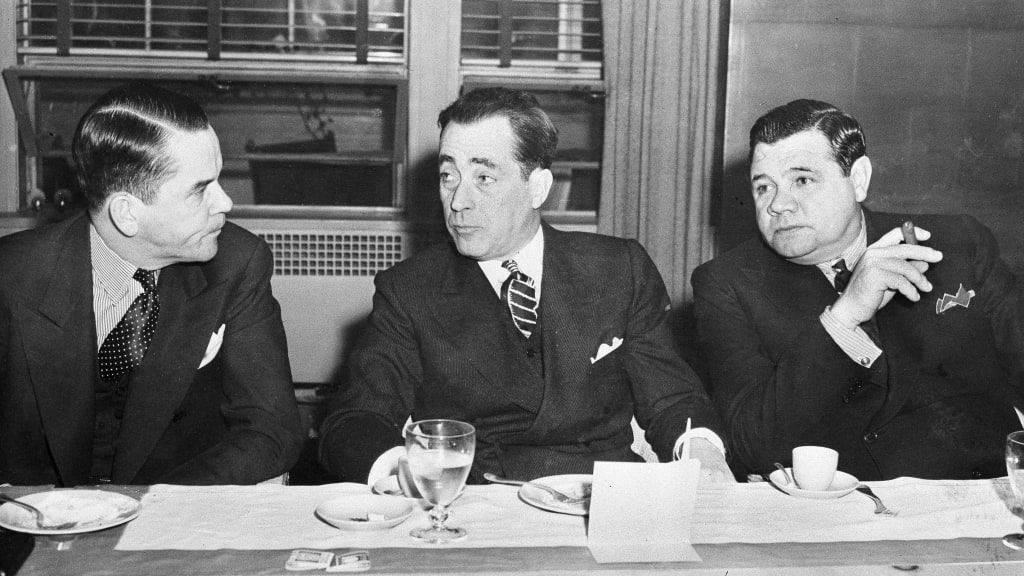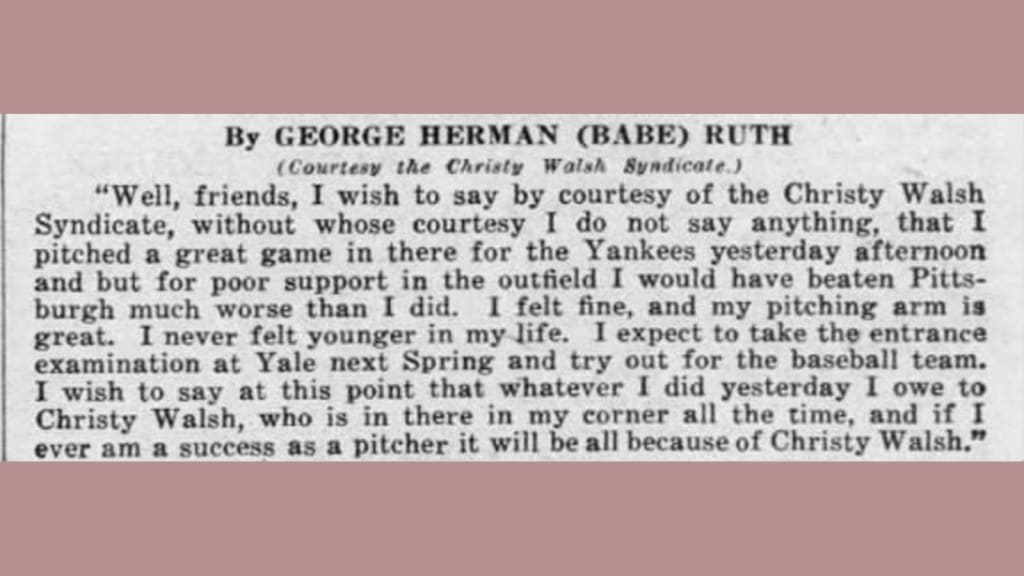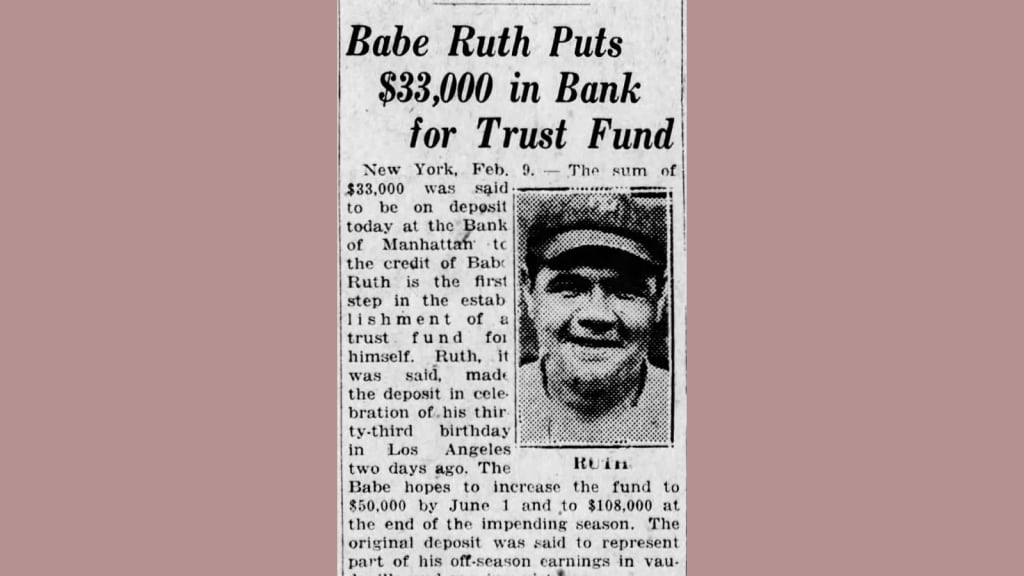
A version of this story was originally published in July 2021.
He posed as a beer deliveryman. Or, actually, no, he snuck in through a window. Or maybe neither of those stories are even remotely true.
In the end, it didn't matter what exactly the truth was: Christy Walsh had ingratiated himself to Babe Ruth and, in a way, became baseball's first agent. But he already understood a much more valuable lesson: The story didn't have to be factual, as long as it felt like it could be true, and of course, if it helped create a legend.
Walsh was a dreamer. And, like so many people, Walsh seemingly fell backward into the job that would define his life and create an entirely new career for countless others in the future. He was trained as a lawyer, but he soon became a cartoonist and reporter for the Los Angeles Herald. He was fired from there, landed at another newspaper and was quickly fired from there, too. He framed one of his pink slips from a boss who said he was overpaid.
After moving to New York to become an ad man, Walsh remembered ghostwriting a story with World War I flying ace Eddie Rickenbacker and the idea hit him: He would start his own ghostwriting syndicate, focusing primarily on sports. Walsh would hire all the best sportswriters out there to write as the best players of the day, and he negotiated deals with newspapers who would get to run the featured content -- placing them ahead of the newspapers who opted not to join in.
It helps that Walsh was a natural PR man. He had hustle -- later boasting that he closed deals with three newspapers in a single day. He had plenty of self-confidence -- Walsh took out a large bank loan to fund his syndicate to get it off the ground. And, most importantly, he knew how to tell a story.
That's clear from the tales surrounding how he first met Babe Ruth and convinced him to join up on the ghostwriting enterprise. According to the story Walsh told his brother, he had come across Babe's hotel room number. He then climbed up a fire escape, snuck in through an open window and -- seeing Babe, ahem, engaged with a woman at the time -- slapped him on the butt and said, "I want to represent you."
Sensational, but probably not true.
The other, more accepted story is more believable, but also probably not true.
As he wrote in his memoir, "Adios to Ghosts," just as Ruth was becoming a superstar in 1921, Walsh had staked out the deli near Ruth's apartment where he liked to buy beer, hoping to run into the big man himself. Instead, one day while he was waiting, Ruth called down requesting a beer delivery. With the usual delivery boy gone, Walsh took it upon himself to bring the case up.
"Here is my lucky break, and in less than 10 minutes I am in the Ruth kitchenette, actually counting bottles with the Babe," Walsh wrote. "Does he recognize me? His exact words follow: 'Sure I know you! Ain’t you been bringin’ our beer for the last two weeks?'"
After Walsh came clean -- that, no, he was not the usual deliveryman -- he laid out his plan: sign up with his syndicate and earn a nice little fee for the work. However Walsh managed to do it, Ruth agreed. Only problem, Walsh forgot to bring the contract and had to race to the train the following morning to get George Herman Ruth to sign on the line.
Now, how much of this story was true?
Turns out, it doesn't matter. "Ruth was forgetful or indifferent to fact," MLB's official historian John Thorn wrote in an email, "and Walsh was a fabulist."

Now, Walsh wasn't the first person to come up with ghostwriting, nor apply it to sports. But he was the first one to recognize just how expansive it could be and how hungry readers were to feel closer to their favorite sports legends. Compare it now to a celebrity's Twitter account, which is often managed by a team of social media specialists, and it makes a lot of sense.
At the time, newspapers covered actors like celebrities, but not athletes. Walsh was the first to recognize that people like Ruth were celebrities -- ones who could move a lot of newspapers. His syndicate ensured that papers across the country would have plenty of content to fill their pages, and he made sure the stories were well-written and engaging. Walsh claimed to have paid more than $100,000 to "30 scribes" including some of the biggest names to ever grace the sports pages, like Ford C. Frick -- who has a broadcasting award named after him at the Hall of Fame -- Damon Runyon, Bozeman Bulger and Gene Fowler.
Legendary manager John McGraw signed on, getting the syndicate through its first year with a multipart story as the legend of Babe was just starting to grow. (Walsh finished that year with $8.96 in his bank balance.) He chased Walter Johnson down in the Pullman car of a train to get his signature, and he managed to get the moody Ty Cobb to join up, too. Nick Altrock became a comedic legend largely because of his work with the ghosts, helping launch his post-playing career as a ballpark clown.
"Public relations agents made Hollywood into The Dream Factory for moviegoers," Thorn said. "Walsh made baseball into The Fame Factory -- more than any earlier publicist, he transformed mere ballplayers into culture heroes. Of course, the advent of newsreels and then radio helped in this regard, too, as had the expansion of the sports pages in major metropolitan dailies."
.Here's a list of Christy Walsh's ghost lineup, alongside their best-known baseball counterparts: pic.twitter.com/F8WfaF3MXc
— John Thorn (@thorn_john) March 21, 2018
Walsh took a cosmopolitan view of the art form. These weren't lies they were peddling, they were simply writing the things that a player would say if they had the chance. Here's how he wrote about it:
"Few baseball players have the time, the mechanical ability or the inclination to operate a typewriter, but who would say that Connie Mack or Joe McCarthy is not qualified to expound on baseball and dictate material to a man who has the ability and experience to put it down on paper. But a newspaper article, bearing the byline of a baseball player and containing ideas or sentiments which have been written without his knowledge or approval, is deceitful, to say the least. My convictions against such a policy are illustrated in the record of the past 16 years. I have never knowingly released copy that was 'fake.'"
Of course, without Ruth, who knows if Walsh would have been successful. But, by the same token, how big would Ruth have become without Walsh? Ruth would still have crushed home runs and changed how the game was played, but would Ruth still inspire children and be so legendary nearly 100 years after he retired without Walsh's careful work?
"Christy Walsh, sometimes known in the sports pages as the Impresario of Swat, and other times as 'the man who relieves Babe of his burden of thinking,' functioned not only as Ruth's agent, but his manager, promoter, factotum, amanuensis, conscience and mythmaker," Jane Leavy wrote in her exhaustive biography of Ruth, "The Big Fella."
Walsh's first brilliant move was to pay Ruth early for that first contract. Given his star power, Ruth had often been swindled with previous deals. So, Walsh decided to pay Ruth the $1,000 he was owed on that first contract three months early.
"I shall never forget the expression on Babe Ruth’s face when I handed him a check for $1,000 at the Polo Grounds, on the Opening Day of the 1921 season," Walsh wrote. "Was he all smiles? According to the agreement, I was not obligated to remit for 90 days, but here was a fellow who had been skinned so many times by strangers that I felt the way to win his confidence was to pay in advance. The plan worked and our mutual confidence has lasted throughout many years. However, to this day, he doesn’t know that I had to borrow $1,000 from a bank at six per cent."
From there, the two were off. Walsh made sure that Ruth's byline was in newspapers all year long, and that the crowds who always wanted more from baseball's biggest slugger were sated. He scheduled photo ops with Ruth and newspaper editors, helping move more copies and keeping the syndicate on the paper's good side.

He scheduled promotional stunts, having Ruth break the record -- one that Walsh invented -- for catching a baseball dropped out of an airplane. That earned Ruth a spot on the front page of The New York Times -- and Walsh made sure only the news he wanted covered was in there. There "was no suggestion in the unsigned Times dispatch, datelined July 22, 1926, that Ruth intentionally ducked the first two balls bombed at him from a thousand feet up, which Major General Benjamin Foulois, chief of the U.S. Army Air Corps, claimed 'knocked him flat,'" Leavy noted.

Walsh did his best to make it look like Ruth stayed out of trouble. He would stage photoshoots with military members and dressed Ruth in military regalia. Ruth would often visit hospitals and orphanages, getting photographed along the way. Now, the Great Bambino seemed to genuinely enjoy meeting and spending time with the children, but Walsh made sure that the rest of the world saw that the same Ruth who might stay out all night before heading to the ballpark had a softer side, too.

But where Walsh became the first baseball agent -- even if that wasn't the term used at the time -- was how he helped monetize everything Ruth did off the field. There were Babe Ruth clothes, Babe Ruth watches, a Babe Ruth candy bar and a failed lawsuit against Baby Ruth candy bars. Walsh managed the schedule for Ruth's offseason barnstorming tours with Lou Gehrig, ensuring that breathless coverage and enormous parties were waiting for the duo in every city they visited.
He got Ruth $62,788 from Quaker Oats, $3,000 for a Whizit coverall ad and $13,433 for Babe Ruth's All America Underwear.
"Walsh was preceded by agents in the realms of theater and film -- they were all players, i.e., entertainers who permitted us to enter their worlds -- but he made a fortune for Ruth in off-field activities and promotions, far exceeding what he got from the Yankees in salary," Thorn said.
Walsh was involved in every part of Ruth's life -- taking a nice 25% cut along the way -- and said that he "did everything but sleep with him." He even tried that. As Leavy noted, "one night, when only a single unoccupied berth was available in their overbooked Pullman, he even tried that. Ruth kicked him out."
But Ruth was always larger than life in everything he did, and he spent lavishly, often outspending the sums he earned on and off the field. Though he was the game's highest earner from 1922-34, he even required an advance on his Yankees contract at times. So, in arguably his wisest move for both Ruth and Ruth's heirs, Walsh soon took over Babe's finances and gave Ruth an allowance, parsing out the money to ensure that the game's biggest star wouldn't go broke.
The pinnacle was a press event called when Ruth needed to show the Yankees and the public at large that he was willing to clear up his wild, hard-partying ways in 1927. So, Walsh convinced Ruth to publicly announce that he had learned the importance of saving money.
"You can penalize me a thousand dollars for each year," Ruth said. "That'll make $33,000 to start with."
Ruth then signed an oversized check to be put in a trust fund at Manhattan Bank. Walsh got the event covered nationwide, showing off a new, more responsible Ruth along the way. But Ruth was still Ruth. As Collier's Magazine wrote, "The Babe later demanded his money back but found that the principal was beyond his reach forever and that he could have nothing but the interest."

So, the next time you see Scott Boras give another wild quote, buy some merch with a player's face on it or watch a player hawk a new energy drink on TV, think of Christy Walsh. He set the template for all that was to come and the world of sports as we know it now.
Walsh summed it up best himself. "Ghost-writing is fascinating," he wrote, "because there’s a little bit of ghosty in the most of us; a little imagination, a little exaggeration."
